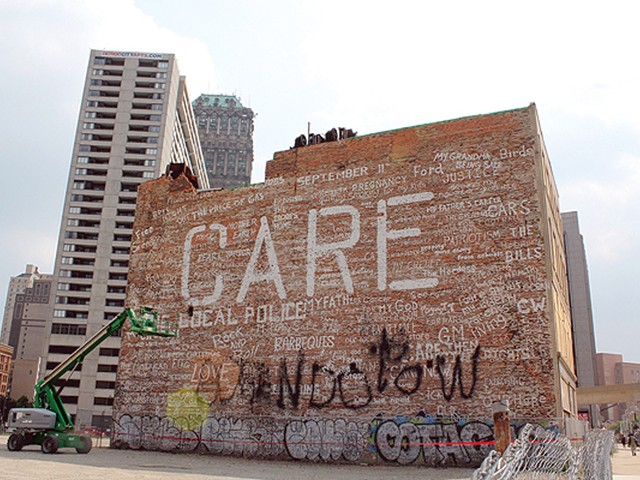Detroit celebrates Grace Lee Boggs’ 100th birthday
[
{
"name": "GPT - Leaderboard - Inline - Content",
"component": "35519556",
"insertPoint": "5th",
"startingPoint": "3",
"requiredCountToDisplay": "3",
"maxInsertions": 100
}
]
In the early ’60s, 3061 Field St., Detroit, was the site of a revolution.
The unassuming brick building was at the time bursting with life, the center of Detroit’s Civil Rights movement. Its tenants, Jimmy and Grace Lee Boggs, were living in the thick of it all. Friend of Malcolm X, a leading force of the Black Power Movement and, notably, a subject of the FBI’s watch list, Boggs, who turns 100 on Saturday, is celebrated as a living representation of Detroit’s past, and of the possibility of its future.
“I think Grace has been one of the most articulate, persistent, and consistent spokespeople about the emerging signs of a more hopeful future coming out of the city of Detroit,” said Shae Howell, fellow activist and co-founder of the Boggs Center. “And certainly she has had that impact on me and on many, many people. We see Detroit through the eyes of someone who has a profound understanding of the role of human choice and human evolution, and that is an extraordinary gift to the city and really to the country.”
Howell, who met Boggs through her activism in the ’70s, admires Boggs as someone who is passionately curious, always searching for more knowledge and understanding of the world and the people around her. “She’s an avid reader. She’s extraordinarily curious and she’s constantly asking new questions,” said Howell. She cites a well-known scene in the acclaimed film American Revolutionary: the Revolution of Grace Lee Boggs to illustrate her point. “That marvelous scene where she gives Danny Glover a pile of books? She does that for everybody. As did Jimmy. These are the 20,000 things you should read this week. And then she would ask you about them. And you would think about them and talk about them and share them. That’s probably the most consistent thing about her character that I think of.”
Howell met Boggs during her involvement in the Civil Rights Movement. In the decades since, however, she and Grace, along with their fellow activists, have been quietly operating a different type of revolution, one centered on the development of the city that Grace has called home since 1953. Through organizations such as Save Our Sons And Daughters (SOSAD) and We The People Reclaim Our Streets, they’ve stood up to the violence and drug abuse affecting Detroit’s youth. Through Detroit Summer and the Boggs Educational Center, they’ve helped spark community projects and the energize the youth leaders that will shape Detroit’s future. They’ve picketed, protested, organized, collaborated, and time and time again helped lead Detroit toward change and a brighter future, turning 3061 Field St. into the Boggs Center after Jimmy’s death in 1993. Today, it is a hub for Detroit’s activists, and a place to “create a legacy of their writing and thinking and organizing, and to do that at the home where they had done so much of their work,” according to Howell.
“I think the Boggs Center, James and Grace, actually helped shape Detroit,” notes Kim Sherrobi, a Boggs Center member. “Really resisting or challenging some of the policies, and even some of the people who were those policies, they had a big impact because they helped shape Detroit in that way. Things couldn’t just be done. It was an accountability, in other words. It was an accountability that Grace and the Boggs Center actually place on those who are in leadership positions, who have influence over people. So they’ve provided a check and balance for the city.”
Since the 1960s, when Boggs was beginning to turn her support toward Martin Luther King’s more peaceful models for reaching change, she has stressed her preference for the term “revolution” over “rebellion.” Rebellions, for her, are negative. They denounce what is and has been instead of providing a framework for what will be. Revolutions, like the one Boggs believes Detroit is currently undergoing, are about change. They’re about the future. They’re about thought and creativity and passion. And they’re about something Grace Lee Boggs has represented for Detroit and the nation during her 100 years: Hope.
The weeklong celebration of the life of Grace Lee Boggs will culminate on Saturday with an anti-violence march at the Church of the Messiah. Detroit citizens and activists, young and old, will be in attendance. They will walk together, in peace and solidarity, and celebrate the 100th year of a truly incredible life, perhaps themselves aware that they are each playing their own tiny part in the revolution of Detroit that it has inspired.





